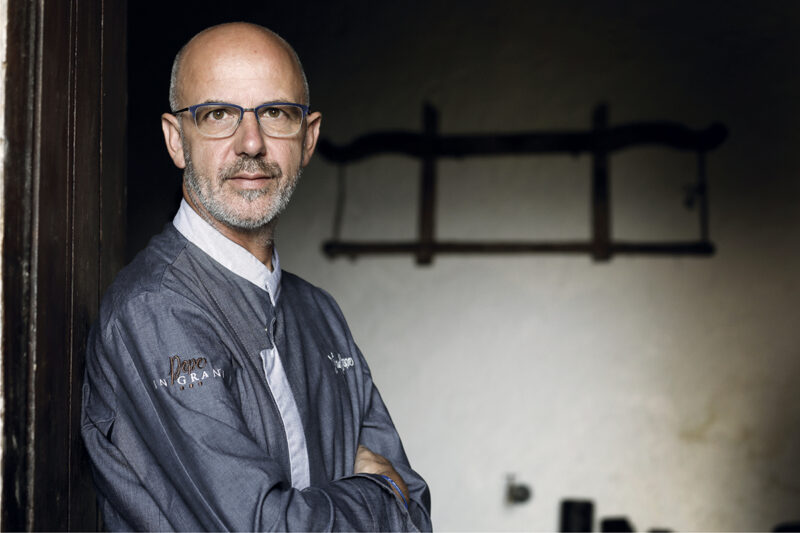In early June, President Sergio Mattarella awarded him the honor of Knight of Merit of the Republic for having distinguished himself in community service during the coronavirus emergency. He closed his restaurant preparing pizzas and biscuits for the poor and the elderly in difficulty and organized a fundraiser for the Caserta hospital. But the epic of the master pizza maker Franco Pepe, patron of the pizzeria Pepe in grains in Caiazzo, had begun much earlier: starting as a child with his father and brothers in the shop created by his grandfather to create a brand capable of attracting people to the province of Caserta. Worldwide.
Defining Pepe as a simple pizza chef is nothing short of an understatement, he is a real artisan of bread making. And his is a small empire: the pizzeria housed in a 1700 building in the heart of a small town in Caserta received over 14 thousand visits a month before Covid-19, from people eager to taste what was defined by the Jonathan Gold Pulizter Prize the “best pizza in the world”.
Furthermore, Pepe in grani is also the only Italian pizzeria included in the Discovery section of the prestigious 50 Best food and wine guide (the one that in 2016 and 2018 crowned the three-starred chef Massimo Bottura, so to speak).
A result that few would have bet on in his youth, when Pepe, despite being born into a family of bakers, also held other jobs such as postman or physical education teacher.
Then the turning point in 2012, when he opened his restaurant. Son of a different conception of pizza, but also of the profession of pizza maker. “I started with my ideas, with bank debts and with the strength of man and his craftsmanship,” he says. “Today I have 42 people working in the alley of a town of 5 thousand souls, where 400 people a day choose to eat my pizza, with many foreign presences, even 12-13 different nationalities per evening”. To achieve these results, however, it was necessary to review the idea of the pizzeria. “There was a concept deriving from the 70s and 80s in which the pizza chef did a little bit of everything. When I opened I decided to work on the team to give dignity to people. I did training. So today there is a kitchen to support the pizzeria, and I have created new roles: there are those in charge of the dough, those who tell about our pizzas and there is the figure of the pizzeria chef. There are 14-15 people to whom I have entrusted different tasks and who all together make the identity of my pizzeria “.
This was the first step necessary to make a pizza a brand, but of course it couldn’t be enough without quality. “I listened to the customer a lot, with the intention of going from good to healthy. If today we continue to talk about my pizza, it is because there is a desire for experimentation, to question tradition, to look with interest at innovation by breaking the mold. I want to follow a path where my work is an act of responsibility, with a healthy approach “. So much so that a nutritionist is also part of his team.
Then in 2017 the Authentica room was inaugurated, a meeting place and direct contact between the pizza chef and customers. Defined as the “smallest pizzeria in the world”, it has a semicircular table with eight seats that intersects with the workbench, which has a small wood oven behind it and can have multiple functions: teaching, study, tasting and discussion . Within this small room, the Authentica stellata took place, a series of meetings in which Maestro Pepe created menus in the company of starred chefs such as Cannavacciuolo, Beck, Esposito and many others.
In 2018 the functional menu also arrives, which aims to clear the pizza from that idea, typical of the collective imagination, which sees it as an exception to the dietary rule. The idea is to bring health to the table, focusing on the right balance between the macronutrients – carbohydrates, proteins and lipids – present in the dish, comparing them equally to the presence of dietary fiber; this, in fact, affects the digestion and assimilation times, reducing them, and contributes to making pizza an excellent single dish.
All this would be enough to define Pepe as a true pizza entrepreneur, but there is even more. Because Pepe has also started his own milling production, with ZeroPepe, a small mill in Franciacorta, “from which the identity of my pizza starts”. And there are also more and more frequent cases of his consultations with the big names in Italian hospitality, or spin offs, such as La Filiale, the restaurant facility within L’albereta di Erbusco. “But without taking advantage of the big cities, because I’m looking for projects that give me the right stimulus. And because with our know-how we must also be able to make spo









